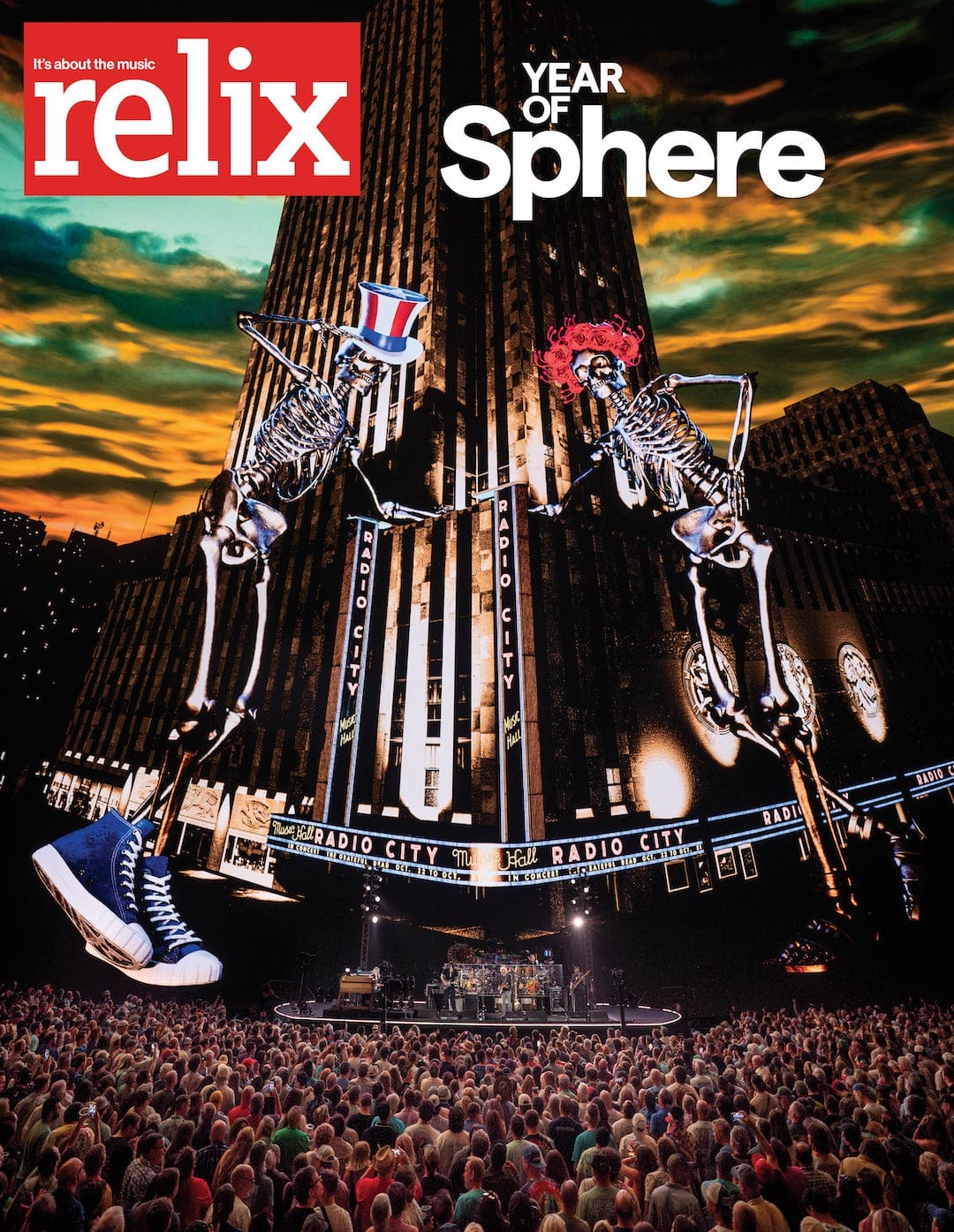Jeff Tweedy: Normal American Kid

With Wilco on a break, Jeff Tweedy takes stock of his singular, Midwestern journey with his first autobiography and companion album.
“I have a long history of oversharing, I guess,” Jeff Tweedy shrugs with a smile. The 51-year-old Wilco founder is sitting at a conference table in the office of his Manhattan publisher, trying to explain why it is that he wrote a book. In front of him are a few small stacks of his new memoir, Let’s Go (So We Can Get Back), published in November by Dutton, alongside a new solo album, Warm. Distilling Tweedy’s particular mix of Midwestern self-effacement and insider punk cool, the book is a lot like attending a Jeff Tweedy solo show, albeit without the music or the possibility that Tweedy might deflate a heckler.
“There’s nothing that useful about a rock-and-roll memoir to begin with,” Tweedy declares, eying the pile of rock-and-roll memoirs in front of him. While he is a voracious reader and active music fan, he says it’s a world he doesn’t know much about. “Everybody’s been askin’ me about my favorites. I’m not a big fan of the genre, which is maybe wrong to say at this point, but maybe that helped me do it without preconceptions.
“I had to learn how to write [in order] to write this book,” says the musician, who published a book of poetry, Adult Head, in 2004. Holing up in his suburban Chicago basement, the family’s lake house in Michigan or (during dead hours) Wilco’s Loft studio, Tweedy woodshedded his way into a new skill set. The editing was “pretty intense,” he admits. “I went through the book maybe eight or nine times to try to keep making adjustments. I just wanted my voice to stay consistent, like we’re hangin’ out.”
The book achieves that, finding a way through an emotionally thorny story balanced with punchlines that often pack real-life punches, with a lifetime spent figuring out their damage. “Too much reality can be depressing and I was up to my eyes in it,” Tweedy writes about the dissolution of his previous band, Uncle Tupelo, in 1994. “Especially up to this point, I’d convinced myself that we lived in an indie-rock version of The Monkees’ house… [but] there was never an episode of The Monkees where Micky Dolenz said, ‘This isn’t fucking fun anymore, I quit,’ and then disappeared.” As it was, Uncle Tupelo’s apartment lasted longer than The Monkees’ two seasons on NBC.
Founding the influential country-punk band with high-school comrade Jay Farrar in suburban Belleville, Ill., in 1987, Tweedy’s professional arc remained tumultuous for nearly its first two decades. Following Uncle Tupelo’s implosion, Wilco’s lineup—besides bassist John Stirratt—turned over completely during the band’s first 10 years, which also included a high-profile break with their label and Tweedy’s very low-profile addiction to painkillers. It’s a career with enough drama to fill a book—and it does.
Beginning by digging through some high-school journals and other ephemera, Tweedy says he quickly shifted into the deeper part of the process. “Once you start writing, you start remembering things,” he says, “conjuring things from your memory by taking the first step. And then it starts to become a little more vivid. It’s almost like hypnotizing yourself to remember details. That’s what it felt like.”
Expending as much time-traveling ink on old family traumas as band breakups, Tweedy does his best to make his rock-and-roll memoir useful. “There are things about my recovery that I thought it could be worthwhile to share because I thought it could be helpful,” he says. “There were things about seeking a creative outlet in your life, which I feel has been so beneficial to me that it’s important to encourage in others, and it’s my rare opportunity to do that, to say, ‘Hey, make stuff! It’s probably gonna make you feel better.’”
Throughout Let’s Go, Tweedy goes under the hood, explaining songwriting techniques like “mumble tracks” and even breaking down the lyrics to “I Am Trying to Break Your Heart.” “It’s amazing how hard it is to put words next to each other without some meaning being generated,” he writes. Perhaps not every reader will mine Let’s Go for songwriting tips (though they could), but Tweedy’s descriptions of discovering music with his high-school friends and looking for a creative voice of his own are thrilling. It’s a book about creating, an obsessive tendency that Jeff Tweedy seems to have nurtured even more since getting sober.
“I love the idea of completely normal people making extraordinary things,” Tweedy says. “I think that’s really what happens more than anything, but it’s hard for people to tolerate that fact, so people project personas onto people who make extraordinary things. People make it mystical. People want to make it something like the tortured artist concept, like ‘I would do that but I don’t have that kind of pain,’” Tweedy says. “But it’s like, ‘Bullshit, everybody does, you just might not know it.’ If [the book] is demystifying in any way, I like that.
“When The Beatles’ Anthology came out, and it had all these outtakes of how they put things together, that didn’t make me like The Beatles any less. It made me feel like The Beatles were more human, which made me love them even more, and it felt like it was something more attainable to aspire to. Like, thinking ‘Wait, I could almost be as good as a Beatle?’ Having that sensation for the first time in my life was huge. So, if anybody cares about music in a way that has exalted it to some mythical status, I can’t think of anything better to do than pull back the veil a little bit.”

For Tweedy, pulling back the veil involves finding new ways to show just exactly how quotidian his domestic life really is, with his family members becoming active characters in the memoir. His wife Susie and son Spencer, especially, act as the occasional counter-voices, breaking into the story in a way that recalls the presence of the real-life Harvey Pekar and Joyce Brabner, knocking down the fourth wall and appearing onscreen in American Splendor, the 2003 film about them.
But while Jeff Tweedy might be an ordinary person striving to make extraordinary things, there’s still only one Jeff Tweedy. More than anything, Let’s Go is a document of his thought process in action, unencumbered by the abstraction of being filtered through lyrics, melodies and other creative decisions.
“He is very in tune with what’s important and also what’s not important,” says Mark Greenberg, a friend of Tweedy’s since the early ‘90s who has served as the full-time engineer at The Loft since 2011. “It’s amazing how many things can be on the ‘not important’ list when the heart of the song cuts through emotionally. Tempo, tuning, internal arrangement logic—all of the songwriter 101 stuff—can be deemed unimportant. ‘Zero fucks given’ is a phrase we use a lot at the studio, which is misleading, but means that we shouldn’t be precious or lost in the details and should be more open to what comes our way. ‘Won’t effect sales’ is another thing Jeff likes to say and, of course, it’s a humorous way of saying something similar. It means things don’t really need to be corrected or graded by conventional rules if the thing is there.”
Having worked at Euclid Records in St. Louis during Uncle Tupelo’s early days, Tweedy still calls himself “a record-store guy” in the present tense, a lifelong affiliation that colors his perception of the world. There’s more than a bit of the learned music geek contrarian in Tweedy’s sensibility, and one senses that the trait could well run further back than that. But it’s hard to tell. One of the book’s most triumphant and beautiful stories is eight- or nine-year-old Tweedy receiving his older brother’s widely curated record collection.
“I went from not being entirely clear on the difference between The Beatles and The Monkees to spending entire weekends listening to the electronic space music of Isao Tomita and losing my grip on reality to Edgar Froese, Atomic Rooster and Hawkwind.” But it’s only one part of a complex origin story that mixes musical joy with examinations of pain.
“Always afraid to be a normal American kid,” Tweedy sang on Wilco’s 2016 song “Normal American Kids,” and that tension of growing up seemingly abnormal in Belleville is one that likewise shades Tweedy’s stories, as well the slow, lifelong realization that there’s nothing necessarily abnormal about that by itself. Emotionally direct, it’s a raw core that the book gets at, especially during a riveting section describing Tweedy’s time in rehab exactly as Wilco’s 2004 masterpiece A Ghost Is Born was hitting stores. His story is rich and contradictory, a normal American kid who—like an increasing amount of Americans in the early 2000s—became addicted to painkillers.
Unlike the vast majority of normal/abnormal American kids, what separates Jeff Tweedy is his remarkable ability to recognize himself and transliterate that self into music in an emotionally nourishing way. “My comfort level with being vulnerable is probably my superpower,” he writes in Let’s Go, and it can be observed in a creative process that is nearly methodical in its regularity, going to work every day at Wilco’s Loft to channel those normal/abnormal vulnerabilities into music.
But, despite owning a studio for nearly 20 years, Tweedy says, “I don’t really press buttons or touch knobs. I feel like if I touch a knob on the mixing desk, then—all of a sudden—I’m only thinking about what the knob does, and that’s not the way people listen to music. People don’t sit with their hand on the treble. Maybe they do, but they’re freaks if they do that.” It’s the kind of micro/macro observation perfectly grown from the space between creative and personal neuroses otherwise known as the self.
Since the turmoil of Wilco’s first decade, Tweedy has settled into a new writing style served by the stability that has emerged around him, and especially having access to his own studio. “At any given moment, there are dozens and dozens of songs that are in various states of completion,” he describes. “I could work on something and come back to it six months or a year later and it’ll feel like someone else’s song. I generally try not to work on anything where I don’t have a feeling of excitement about it. It’s like, I’ll have a track with bass, drum and acoustic guitar on it and then I listen to it later and think, ‘Oh, it’d be cool if there was an electric guitar,’ and then it could be another four months before I listen to it again and try to figure out how to play the keyboard part I’m hearing. It sounds disjointed, but it’s a fun way to do it.”
Providing Tweedy with a creative grounding perhaps equal to that of Wilco, The Loft has created its own lore. Along with the Wilco spin-offs and Tweedy’s production gigs (Mavis Staples, Richard Thompson), it even has its own lost albums. Greenberg recalls a time when Tweedy was asked to write music for a set of unrecorded Bob Dylan lyrics—a project which, without Tweedy’s involvement, became the New Basement Tapes.
But before that happened, Greenberg remembers, “Jeff was so inspired by these Dylan lyrics that were shared with him that, over the course of two days, he wrote and recorded an album’s worth of songs using and drawing from the Dylan lyrics.” The producers went in a different direction with the project. “It’s a very special group of songs and recordings that we revisit from time to time and we are still knocked out by it all,” says Greenberg.
Tweedy’s slow-motion creativity can be seen unfolding in the pages of Let’s Go, as he begins to work on the solo album that would become Warm, issued concurrently with the memoir. While Wilco’s lineup settled down with the 2004 addition of guitarist Nels Cline, the band’s early stylistic leaps between albums likewise settled down into a richer but perhaps more predictable sound. Let’s Go and Warm seem like the mark of a new layer in his creative development, the obscured “American aquarium drinker” and other writing exercises turned to something more plainspoken.
“There was an effort to be understood,” he says of writing Let’s Go. “I think if you’re going to take the time to write a book, especially a memoir, the point is to relate the stories in a clear and sincere way. It was a little bit more immediate than writing songs. For the book, when I got a story told in a way where I could read it out loud and it sounded good—it sounded clear and the story seemed like it was coming across, that felt really good and finite—like it was something you could tweak forever but it wasn’t going to get any clearer.
“So just going for that clarity maybe had some impact on trying to get a lot of my lyrics to work that way on the new record, a little bit more than I’ve tried in the past. I’ve always been comfortable leaving more for the listener to color in, but I think it was a good thing to push myself to do that because I feel like the songs became much better when I pushed myself to make them more clear.”
 photo by Wes Orshoski
photo by Wes Orshoski
To some extent, Let’s Go feels like a promotional effort for Warm, or perhaps Warm feels like a postscript commentary on Let’s Go. “It’s hard to say/ What I’ve been through/ Should matter to you,” Tweedy sings on the opening “Bombs Above.” The album arrives near the end of Wilco’s first full-year hiatus, during which drummer Glenn Kotche lived abroad in Finland to accompany his wife while she studied medical-device design through a Fulbright Scholarship and the band, as a whole, took some time away to recharge. Like Sukierae, his previous extra-Wilco album, Tweedy plays nearly all the instruments except the drums, provided by his son Spencer who is a wonderfully inventive player in the school of experimental modern-rock drumming virtually invented by Kotche.
“He’s a very thoughtful young boy,” says Tweedy, who marvels over both of his sons in Let’s Go, which—in addition to being a memoir of turbulent rock bands, addiction and creativity—likewise possesses its share of dorky and charming daddom. And, indeed, Tweedy is a charming dad, doddering down to the basement to crank up the amps and share hilarious lore from three decades on the road, including his sons’ shared favorite: an amazing Gene Ween anecdote nestled in the book’s epilogue.
“I want to write a whole book of short half paragraphs,” Tweedy laughs, “a couple of sentences each, just trying to distill stories like that into as small a space as possible. I’ve got millions of them. Like Dan Stuart from Green on Red breaking a string during the first song and sitting at the bar for the rest of the night because it was a bad omen.”
With Let’s Go (So We Can Get Back), Jeff Tweedy makes his own significant contributions to the lore of rock-and-roll. Perhaps it’s not a surprise that it’s as good as it is. Even if Tweedy has never read them, rock memoirs often mirror their creators’ personalities: Bob Dylan’s Chronicles being inscrutable and probably largely bullshit, Neil Young’s Waging Heavy Peace being cranky and soulfully inconsistent, Keith Richards’ Life being stadium-sized and grandiose. Jeff Tweedy is much younger than any of those classic rockers, but Let’s Go (So We Can Get Back) is funny, thoughtful, quietly dramatic and nice to hang out with.
This article originally appears in the December 2018 issue of Relix. For more features, interviews, album reviews and more, subscribe here.



















